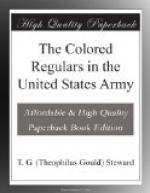either of your Excellency’s forces or my own,
the final result, under circumstances so disadvantageous
to your Excellency being a foregone conclusion.
As your Excellency may wish to make reference of so momentous a question to your Excellency’s home government, it is for this purpose that I have placed the time of the resumption of hostilities sufficiently far in the future to allow a reply being received.
I beg an early answer from your Excellency.
I have the honor to be,
Very respectfully, your obedient servant,
W. R. SHAFTER,
Major-General, Commanding.
Headquarters Fifth Army
Corps,
Camp near Santiago,
July 9, 1898.
Hon. Secretary of War, Washington, D. C.
I forwarded General Toral’s proposition to evacuate the town this morning without consulting any one. Since then I have seen the general officers commanding divisions, who agree with me in that it should be accepted.
1st. It releases at once the harbor.
2d. It permits the return of thousands of women, children and old men, who have left the town, fearing bombardment, and are now suffering fearfully where they are, though I am doing my best to supply them with food.
3d. It saves the
great destruction of property which a
bombardment would entail,
most of which belongs to Cubans
and foreign residents.
4th. It at once releases this command while it is in good health for operations elsewhere. There are now three cases of yellow fever at Siboney in a Michigan regiment, and if it gets started, no one knows where it will stop.
We lose by this, simply some prisoners we do not want and the arms they carry. I believe many of them will desert and return to our lines. I was told by a sentinel who deserted last night that two hundred men wanted to come, but were afraid our men would fire upon them.
W.R. SHAFTER,
Major-General, United
States Volunteers.
Reply.
Washington, D.C., July 9, 1898.
Major-General Shafter, Playa, Cuba.
In reply to your telegram recommending terms of evacuation as proposed by the Spanish commander, after careful consideration by the President and Secretary of War, I am directed to say that you have repeatedly been advised that you would not be expected to make an assault upon the enemy at Santiago until you were prepared to do the work thoroughly. When you are ready this will be done. Your telegram of this morning said your position was impregnable and that you believed the enemy would yet surrender unconditionally. You have also assured us that you could force their surrender by cutting off their supplies. Under these circumstances, your message recommending that Spanish troops be permitted to evacuate




